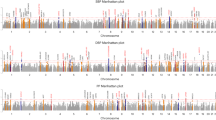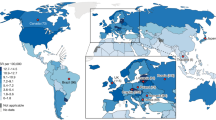Abstract
Prostaglandin endoperoxidase synthase 2 is a key regulator of inflammation and may play a role in prostate carcinogenesis. The polymorphism, –899G>C (rs20417), alters a transcription factor-binding site and is associated with a reduced risk of colorectal adenoma. We tested the hypothesis that rs20417 may influence prostate cancer risk, using a large case–control study (ncases=1608, ncontrols=3058). We found no evidence that rs20417 alters prostate cancer risk (odds ratio (ORCC & GC v GG=1.05, 95% confidence interval (CI)=0.91–1.20). A meta-analysis of three studies also found little evidence that rs20417 alters risk (pooled ORCC & GC v GG=1.04, 95% CI=0.93–1.17), making it unlikely that rs20417 contributes in any major way to prostate cancer aetiology.
This is a preview of subscription content, access via your institution
Access options
Subscribe to this journal
Receive 4 print issues and online access
$259.00 per year
only $64.75 per issue
Buy this article
- Purchase on Springer Link
- Instant access to full article PDF
Prices may be subject to local taxes which are calculated during checkout

Similar content being viewed by others
References
Rowan S, Rachet B, Alexe DM, Cooper N, Coleman MP . Survival from prostate cancer in England and Wales up to 2001. Br J Cancer 2008; 99: S75–S77.
Parkin DM, Bray F, Ferlay J, Pisani P . Global Cancer Statistics, 2002. CA Cancer J Clin 2005; 55: 74–108.
Johns LE, Houlston RS . A systematic review and meta-analysis of familial prostate cancer risk. BJU Int 2003; 91: 789–794.
Lichtenstein P, Holm NV, Verkasalo PK, Iliadou A, Kaprio J, Koskenvuo M et al. Environmental and heritable factors in the causation of cancer-analyses of cohorts of twins from Sweden, Denmark, and Finland. N Eng J Med 2000; 343: 78–85.
De Marzo AM, Platz EA, Sutcliffe S, Xu J, Grönberg H, Drake CG . Inflammation in prostate carcinogenesis. Nat Rev Cancer 2007; 7: 256–269.
Hussain T, Gupta S, Mukhtar H . Cyclooxygenase-2 and prostate carcinogenesis. Cancer Lett 2003; 191: 125–135.
Uotila P, Valve E, Martikainen P, Nevalainen M, Nurmi M, Härkönen P . Increased expression of cyclooxygenase-2 and nitric oxide synthase-2 in human prostate cancer. Urol Res 2001; 29: 25–28.
Gupta S, Srivastava M, Ahmad N, Bostwick DG, Mukhtar H . Over-expression of cyclooxygenase-2 in human prostate adenocarcinoma. Prostate 2000; 42: 73–78.
Yoshimura R, Sano H, Masuda C, Kawamura M, Tsubouchi Y, Chargui J et al. Expression of cyclooxygenase-2 in prostate carcinoma. Cancer 2000; 89: 589–596.
Lee LM, Pan CC, Cheng CJ, Chi CW, Liu TY . Expression of cyclooxygenase-2 in prostate adenocarcinoma and benign prostatic hyperplasia. Anticancer Res 2001; 21: 1291–1294.
Mahmud S, Franco E, Aprikian A . Prostate cancer and use of nonsteroidal anti-inflammatory drugs: systematic review and meta-analysis. Br J Cancer 2004; 90: 93–99.
Panguluri RCK, Long LO, Chen W, Wang S, Coulibaly A, Ukoli F et al. COX-2 gene promoter haplotypes and prostate cancer risk. Carcinogenesis 2004; 25: 961–966.
Schmedtje Jr JF, Ji YS, Liu WL, DuBois RN, Runge MS . Hypoxia induces cyclooxygenase-2 via the NF-kappa B p65 transcription factor in human vascular endothelial cells. J Biol Chem 1997; 272: 601–608.
Lukiw WJ, Bazan NG . Strong nuclear factor-B-DNA binding parallels cyclooxygenase-2 gene transcription in aging and in sporadic Alzheimer's disease superior temporal lobe neocortex. J Neurosci Res 1998; 53: 583–592.
Charalambous MP, Maihöfner C, Bhambra U, Lightfoot T, Gooderham NJ, Colorectal Cancer Study Group. Upregulation of cyclooxygenase-2 is accompanied by increased expression of nuclear factor-kappa B and I kappa B kinase-alpha in human colorectal cancer epithelial cells. Br J Cancer 2003; 88: 1598–1604.
Ding J, Wu K, Zhang D, Luo W, Li J, Ouyang W et al. Activation of both nuclear factor of activated T cells and inhibitor of nuclear factor-kappa B kinase beta-subunit-nuclear factor-kappa B is critical for cyclooxygenase-2 induction by benzo [a] pyrene in human bronchial epithelial cells. Cancer Sci 2007; 98: 1323–1329.
Papafili A, Hill MR, Brull DJ, McAnulty RJ, Marshall RP, Humphries SE et al. Common promoter variant in cyclooxygenase-2 represses gene expression evidence of role in acute-phase inflammatory response. Arterioscler Thromb Vasc Biol 2002; 22: 1631–1636.
Brosens LAA, Iacobuzio-Donahue CA, Keller JJ, Hustinx SR, Carvalho R, Morsink FH . Increased cyclooxygenase-2 expression in duodenal compared with colonic tissues in familial adenomatous polyposis and relationship to the -765G -> C COX-2 polymorphism. Clin Cancer Res 2005; 11: 4090–4096.
Ulrich CM, Whitton J, Yu JH, Sibert J, Sparks R, Potter JD et al. PTGS2 (COX-2)-765G> C promoter variant reduces risk of colorectal adenoma among nonusers of nonsteroidal anti-inflammatory drugs. Cancer Epidemiol Biomarkers Prev 2005; 14: 616–619.
Avery KNL, Blazeby JM, Lane JA, Neal DE, Hamdy FC, Donovan JL . Decision-making about PSA testing and prostate biopsies: a qualitative study embedded in a primary care randomised trial. Eur Urol 2008; 53: 1186–1193.
Donovan J, Hamdy F, Neal D, Peters T, Oliver S, Brindle L et al. Prostate testing for cancer and treatment (ProtecT) feasibility study. Health Technol Assess 2003; 7: 1–88.
Zuccolo L, Harris R, Gunnell D, Oliver S, Lane JA, Davis M et al. Height and prostate cancer risk: a large nested case-control study (ProtecT) and meta-analysis. Cancer Epidemiol Biomarkers Prev 2008; 17: 2325–2336.
Giovannucci E, Liu Y, Platz EA, Stampfer MJ, Willett WC . Risk factors for prostate cancer incidence and progression in the health professional's follow-up study. Int J Cancer 2007; 121: 1571.
Kristal AR, Stanford JL . Cruciferous vegetables and prostate cancer risk confounding by PSA screening. Cancer Epidemiol Biomarkers Prev 2004; 13: 1265.
Cheng I, Liu X, Plummer S, Krumroy L, Casey G, Witte J . COX-2 genetic variation, NSAIDs, and advanced prostate cancer risk. Br J Cancer 2006; 97: 557–561.
Bethke L, Sullivan K, Webb E, Murray A, Schoemaker M, Auvinen A et al. CASP8 D302H and meningioma risk: an analysis of five case-control series. Cancer Lett 2009; 273: 312–315.
Acknowledgements
The authors would like to acknowledge the tremendous contribution of all members of the ProtecT study research group, and especially the following who were involved in this research (Jane Athene Lane, Prasad Bollina, Sue Bonnington, Debbie Cooper, Angie Cox, Michael Davis, Liz Down, Andrew Doble, Alan Doherty, Emma Elliott, David Gillatt, Pippa Herbert, Peter Holding, Joanne Howson, Mandy Jones, Roger Kockelbergh, Howard Kynaston, Teresa Lennon, Norma Lyons, Hilary Moody, Philip Powell, Stephen Prescott, Liz Salter and Pauline Thompson). The ProtecT study is funded by the UK NIHR Health Technology Assessment Programme (projects 96/20/06, 96/20/99). The authors would like to acknowledge the provision of additional epidemiological data by the NHS R&D Directorate supported Prodigal study and the ProMPT collaboration, which is supported by the National Cancer Research Institute (NCRI) formed by the Department of Health, the Medical Research Council and Cancer Research UK. Genotyping was funded by the World Cancer Research Fund.
Author information
Authors and Affiliations
Corresponding author
Rights and permissions
About this article
Cite this article
Murad, A., Lewis, S., Smith, G. et al. PTGS2–899G>C and prostate cancer risk: a population-based nested case–control study (ProtecT) and a systematic review with meta-analysis. Prostate Cancer Prostatic Dis 12, 296–300 (2009). https://doi.org/10.1038/pcan.2009.18
Received:
Revised:
Accepted:
Published:
Issue Date:
DOI: https://doi.org/10.1038/pcan.2009.18
Keywords
This article is cited by
-
The study of neuroprotective effects and underlying mechanism of Naoshuantong capsule on ischemia stroke mice
Chinese Medicine (2020)
-
Pharmacogénétique des anti-inflammatoires non stéroïdiens
Douleur et Analgésie (2013)



